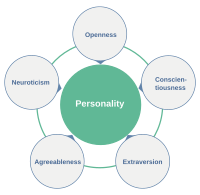
Photo from wikipedia
Current debate in the field of animal personality revolves around whether personality is reflecting individual differences in resource allocation or acquisition. Despite the large body of literature, the proximate relationships… Click to show full abstract
Current debate in the field of animal personality revolves around whether personality is reflecting individual differences in resource allocation or acquisition. Despite the large body of literature, the proximate relationships between personality, resource allocation, and acquisition are still unclear, especially during early stages of development. Here we studied how among-individual differences in behaviour develop over the first 6 months of life, and their potential association with resource acquisition in a free-ranging population of fallow deer (Dama dama). We related proxies of neonate personality – i.e. neonate physiological (heart rate) and behavioural (latency to leave at release) anti-predator responses to human handling – to the proportion of time fawns allocated to scanning during their first summer and autumn of life. We then investigated whether there was a trade-off between scanning time and foraging time in these juveniles, and how it developed over their first 6 months of life. We found that neonates with longer latencies at capture (i.e. risk-takers) allocated less time scanning their environment, but that this relationship was only present when fawns were 3-6 months old during autumn, but not when fawns were only 1-2 months old during summer. We also found that time spent scanning was negatively related to time spent foraging – a relationship rarely tested in juveniles of large mammals - and that this relationship becomes stronger over time, as fawns gradually switch from a nutrition rich (milk) to a nutrition poor (grass) diet. Our results highlight a potential mechanistic pathway in which neonate personality may drive differences in early-life resource acquisition, through allocation, of a large social mammal.
Journal Title: Behavioral Ecology
Year Published: 2022
Link to full text (if available)
Share on Social Media: Sign Up to like & get
recommendations!